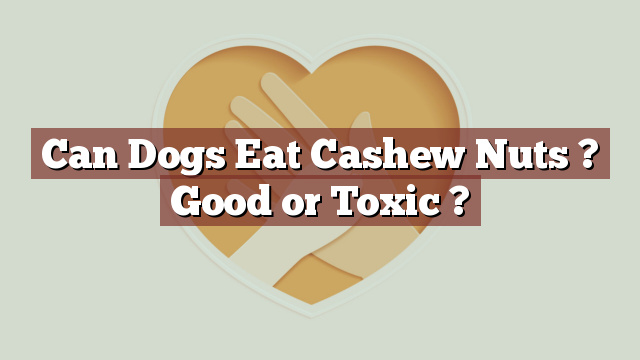Can Dogs Eat Cashew Nuts? Good or Toxic?
As responsible pet owners, it is crucial to be knowledgeable about the foods that are safe for our furry friends. Our dogs’ health and well-being depend on what we feed them. One common question that arises is, can dogs eat cashew nuts? Let’s explore the nutritional value of cashew nuts, safety factors, potential risks or benefits, and actions to take if your dog consumes them.
Nutritional Value of Cashew Nuts: Essential Nutrients for Dogs
Cashew nuts are not only delicious for humans but also contain several essential nutrients that can benefit our canine companions. They are a great source of protein, healthy fats, vitamins, minerals, and antioxidants. These nutrients can play a vital role in maintaining a dog’s overall health. However, it is important to remember that dogs have different dietary requirements than humans, and their diet should primarily consist of dog-specific foods.
Can Dogs Eat Cashew Nuts? Safety and Toxicity Factors Explored
Dogs can eat cashew nuts in moderation, but there are safety factors to consider before offering them as a treat. While cashew nuts are not inherently toxic to dogs, they can pose some risks. Cashews are high in fat, which can lead to pancreatitis if consumed in large amounts. Additionally, the shape and size of cashew nuts can pose a choking hazard or lead to intestinal blockage if not chewed properly.
It is crucial to avoid feeding dogs cashew nuts that are flavored, salted, or coated with any seasonings. These additives, such as salt or spices, can be harmful to dogs and may cause digestive issues or even sodium toxicity. Therefore, plain, unsalted cashew nuts are the safest option if you decide to share them with your furry friend.
Potential Risks or Benefits of Cashew Nut Consumption in Dogs
While cashew nuts offer some nutritional value, it is important to weigh the potential risks against the benefits. As mentioned earlier, the high-fat content in cashew nuts can lead to pancreatitis, especially in dogs prone to this condition. Furthermore, the excessive intake of cashew nuts can contribute to weight gain and obesity, which can lead to various health problems.
On the other hand, the nutrients found in cashew nuts, such as protein, healthy fats, and antioxidants, can provide some health benefits to dogs. These nutrients can support their immune system, promote healthy skin and coat, and aid in overall digestion. However, it is crucial to remember that cashew nuts should not replace a balanced and appropriate dog diet.
What to Do If Your Dog Eats Cashew Nuts: Precautions and Actions
If your dog accidentally consumes cashew nuts, it is important to take certain precautions and actions. Firstly, observe your dog for any signs of discomfort, such as vomiting, diarrhea, or difficulty breathing. If you notice any abnormal behavior or symptoms, it is advisable to contact your veterinarian immediately. They will be able to provide professional guidance based on your dog’s specific situation.
Moreover, if you regularly feed your dog cashew nuts as a treat, make sure to do so in moderation. Remember to offer plain, unsalted cashew nuts only and ensure that they are well-chewed to prevent choking hazards. Always prioritize your dog’s health and well-being by consulting with a veterinarian before introducing any new food into their diet.
Conclusion: Moderation and Professional Advice Key in Feeding Cashew Nuts to Dogs
In conclusion, dogs can eat cashew nuts in moderation, but it is important to proceed with caution. While cashew nuts offer some nutritional value, the risks associated with their consumption should not be ignored. It is essential to prioritize a dog’s specific dietary needs and consult with a veterinarian before introducing cashew nuts into their diet. Remember, moderation is key, and professional advice is invaluable in ensuring the health and safety of our beloved pets.
Thank you for investing your time in exploring [page_title] on Can-Eat.org. Our goal is to provide readers like you with thorough and reliable information about various dietary topics. Each article, including [page_title], stems from diligent research and a passion for understanding the nuances of our food choices. We believe that knowledge is a vital step towards making informed and healthy decisions. However, while "[page_title]" sheds light on its specific topic, it's crucial to remember that everyone's body reacts differently to foods and dietary changes. What might be beneficial for one person could have different effects on another. Before you consider integrating suggestions or insights from "[page_title]" into your diet, it's always wise to consult with a nutritionist or healthcare professional. Their specialized knowledge ensures that you're making choices best suited to your individual health needs. As you navigate [page_title], be mindful of potential allergies, intolerances, or unique dietary requirements you may have. No singular article can capture the vast diversity of human health, and individualized guidance is invaluable. The content provided in [page_title] serves as a general guide. It is not, by any means, a substitute for personalized medical or nutritional advice. Your health should always be the top priority, and professional guidance is the best path forward. In your journey towards a balanced and nutritious lifestyle, we hope that [page_title] serves as a helpful stepping stone. Remember, informed decisions lead to healthier outcomes. Thank you for trusting Can-Eat.org. Continue exploring, learning, and prioritizing your health. Cheers to a well-informed and healthier future!

